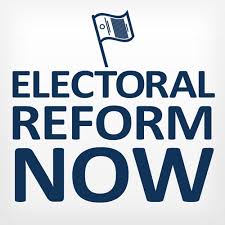Being political doesn’t only or principally mean caring what party wins the next election; to be political is to care about the happiness of strangers.
― Alain de Botton

An article this morning in the local paper caught my eye, dealing as it did with a favourite topic of mine: electoral reform. I’m probably not joined by a great many of my friends and acquaintances when I say that I am satisfied with the system we have inherited from the British. Proponents of proportional representation decry how their votes (and voices) are not counted in a system where a party which receives only 40% (for example) of the popular vote ends up with a majority of seats.
Let’s discount the obvious first. All votes that were cast were, very obviously, “counted”. That’s how a winner is determined in an individual constituency. But that’s not the sense in which the naysayers mean “counted”. In their view, in order for their votes to “count” (what they really mean is “matter”), they must see their collective numbers, across all constituencies, result in someone being elected under their party’s banner.

To my way of thinking, this represents a profound difference in how one values an electoral system and, in fact, government itself. Our current system allows local people the opportunity to elect a local representative. Once that councillor, MLA or MP is elected, he/she becomes EVERYONE’s representative. If you are among those who choose to believe that that is just not true, then I suspect you are more partisan and ideological in your thinking than I am.

Representation and governance are not the same thing. Every vote cast in an election is counted but the hard truth is that elections have winners and losers. Those who long for proportional representation will not consider their voices heard until such time as they have a legislator in place sporting the party colours. Governance, first and foremost, should be effective, and a system which tends to majority governments offers the best chance of that. Those in favour of proportional representation argue that it tends to make compromise inevitable. If you take a look around the world, all too often it ends up leading to gridlock and chaos.

No system is perfect and the current one could, undoubtedly, use improvement. Can we please get over the idea, though, that Canadian government is is dire need of an overhaul? We are a peaceful, wealthy, diverse and well-respected country. Surely our electoral system has played some role in making it that way.
As I said earlier, those who oppose the current system don’t like it when someone with whom they are directly affiliated fails to be elected in some way. And the unstated premise is that no one can conceivably represent someone’s interests unless such a person is of the same political stripe. I prefer a more optimistic view, one where the elected representative takes the charge of representing a constituency seriously and realizes that said constituency includes one and all. To me, such a view suggests a respect for diversity that we are, surely, very much in need of these days.
Nice article, Carl, and may I say it’s nice to read the blog again (I haven’t seen posts in a while and I’m not sure if there haven’t been (m)any or if I’m just not receiving them. In any case, I always like reading your well thought out posts. My chief objection to your argument this time is that it seems idealistic that the person once elected represents every constituent. Even just in the most recent political turmoil here in Nova Scotia, even though I did have a chance to speak with and meet my MLA (good thing), there was no way that she represented me (bad thing) and what’s even more frustrating is that there’s no way of knowing if she represented any and if so how many of her constituents. The arguments are always made “I hear comments from people in my riding that say x,y,&z “which is the opposite of what I am telling my representative which is, let’s say a,b,&c. And although I like you am an optimist and idealist I have a hard time believing that, in this particular situation any teacher would have said x,y, or z to the MLA, but I have no way of knowing. Furthermore, although ideally once elected the MLA would represent everybody, surely they are somewhat beholden to the people who elected them (the 40% in your example) and they in fact represent that 40% better or more effectively than the other 60%. And there’s the rub. While I agree that there’s a huge difference between representation and governance, I believe that there can be a better correlation between the two in a different electoral system. How nice it is though to be able to disagree. Welcome back! I look forward to more.
LikeLike
Thank you, Paul, for taking the time both to read and to respond to my musings. I will say only that I choose a particular ideal rather than another, recognizing that no system designed by human beings can ever, in application, be anything but imperfect. Simply put, I perceive (key word) the history of politics to support my contention that the Westminster system is the best of the worst (with echoes of Churchill inherent in such a statement).
LikeLike